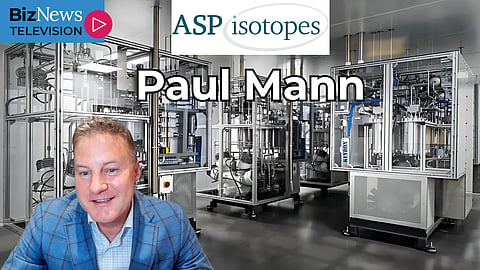ASP Isotopes: The SA nuclear tech maverick disrupting a Russian-dominated industry - Paul Mann
ASP Isotopes CEO Paul Mann is building laser-powered nuclear facilities in South Africa to produce rare isotopes critical to quantum computing, cancer treatment, and advanced semiconductors - taking on Russian dominance and reshaping global supply chains, all from Pretoria.
Sign up for your early morning brew of the BizNews Insider to keep you up to speed with the content that matters. The newsletter will land in your inbox at 5:30am weekdays. Register here.
Support South Africa’s bastion of independent journalism, offering balanced insights on investments, business, and the political economy, by joining BizNews Premium. Register here.
If you prefer WhatsApp for updates, sign up to the BizNews channel here.
Watch here:
Listen here:
Highlights from the interview
When Paul Mann last spoke to Alec Hogg two and a half years ago, ASP Isotopes was a fledgling venture recovering from South African business rescue proceedings. Today, it’s a $100 million disruptor in a space monopolized for decades by Russia. With cutting-edge laser enrichment technology and a footprint firmly rooted in South Africa, ASP Isotopes is becoming one of the most exciting stories on the Johannesburg and NASDAQ stock exchanges.
From rescue to revolution
ASP Isotopes’ journey began with the acquisition of dormant nuclear enrichment technologies in South Africa. Unlike Russia’s large-scale centrifuge model, Mann’s company uses compact, capital-efficient, laser-based systems capable of enriching both light and heavy isotopes. This includes silicon-28 - a critical material for the next generation of quantum computers and semiconductors.
“Our process is so unique that no one else has replicated it,” Mann told BizNews editor Alec Hogg. “While Russia’s centrifuges spin the cylinder, our tech spins the gas. It’s ideal for exotic isotopes that can’t be gasified - things like Ytterbium-176 and Carbon-14, which we’re now producing commercially.”
Displacing Russian dominance
The war in Ukraine may not have halted Russian isotope exports, but it has exposed the world’s dependence on a volatile supplier. For Mann, who used to short companies at Soros and Highbridge because they couldn’t source isotopes, this presented an opportunity.
"Most of the world’s nuclear and medical isotopes still come from Russia," Mann said. "We're not just offering a viable alternative - we're offering a better, more reliable, and locally grounded one."
ASP is already shipping silicon-28 to a major US semiconductor firm and a leading global gas company. Its carbon-14 plant is locked into a $2.5 million annual deal with a Canadian partner. And its laser-based ytterbium facility is operating at full tilt, supplying a cancer treatment isotope in global short supply.
Building in Africa, backed by Bill Gates
ASP’s ambitions don’t stop at Pretoria. In partnership with Nexa (South Africa’s nuclear agency) and TerraPower - Bill Gates’ nuclear venture - Mann plans to revive uranium enrichment at the historic Pelindaba site to produce HALEU (high-assay low-enriched uranium) for next-gen reactors.
Permitting is underway with South Africa’s National Nuclear Regulator. A test bench has already been built. “It would take 10 to 15 years to get approval in the US,” said Mann. “In Africa, it’s faster. There’s great engineering talent here, and the government’s been very supportive.”
Frugal, focused, and ready to list
Despite raising over $100 million since 2020, Mann describes ASP as “frugal.” The company doesn’t sponsor events or splurge on perks. “Every dollar we spend, 10 cents is mine. I’m the largest shareholder,” he noted. “We’ve still got $60 million in cash to build five more laser plants.”
These will include facilities for isotopes like nickel-64, zinc-68, and gadolinium-160 - materials essential to medicine, imaging, and advanced tech. While ASP plants will be built in South Africa, Mann plans to ship some to Iceland to take advantage of low-cost green energy.
JSE listing coming soon
Given that 149 of ASP’s 153 employees are South African and most of its operations are based there, Mann feels a JSE listing is a natural next step. “The heartbeat of our company is in South Africa,” he said. “It’s only fair South Africans can invest in and benefit from it.”
ASP expects to list on the JSE by mid-2025, with no immediate plans to raise capital. “We’re well-funded and moving quickly. ASP also stands for ‘As Soon as Possible’,” Mann joked.
A “Fat Pitch” moment
Mann's trajectory from Cambridge chemical engineering grad to Wall Street fund manager to isotope industry CEO reads like a Warren Buffett parable. “This was a fat pitch,” he said. “A once-in-a-lifetime opportunity. Scientists had brilliant tech but no business plan. That’s where I came in.”
He doesn’t see ASP’s story as unique, either. “This won’t be the last time I find brilliant scientists who need help turning research into a business. That’s often where the best investment opportunities lie.”
With South Africa at the heart of this high-stakes, high-tech isotope revolution, and with global supply chains being redrawn, Paul Mann and ASP Isotopes may just be on the cusp of something world-changing.

